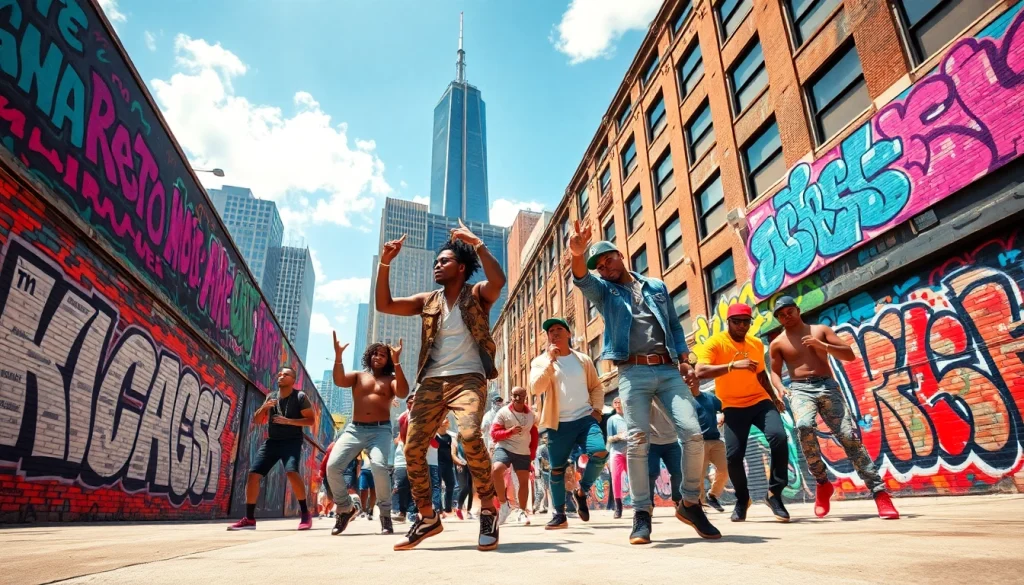Introduction to Chicago Hip-Hop Artists
Chicago’s hip-hop scene is a rich tapestry woven with the stories, struggles, and triumphs of its artists. From the early days of the genre in the 1980s to the present day, Chicago has birthed some of the most influential and innovative artists in the music industry. This city is home to a diverse array of styles, voices, and cultural influences that continue to shape the soundscape of hip-hop globally. Among those voices, you can find Chicago hip-hop artists who blend storytelling with social commentary, reflecting the realities of life in the Windy City. This article aims to explore the origins, evolution, and significance of Chicago’s hip-hop scene, highlighting the artists who have made a substantial impact both locally and worldwide.
The Origins and Evolution of Chicago Hip-Hop
The roots of Chicago hip-hop can be traced back to the early 1980s, with pioneers like the group Common Sense (now known simply as Common) and the legendary DJ Jamal Shabazz. The genre began to flourish as local artists utilized the platform to express their lived experiences and cultural backgrounds. Early Chicago hip-hop was characterized by its blending of jazz, funk, and soul influences, setting it apart from the dominant East Coast and West Coast styles at the time.
As the ’90s rolled in, artists like Twista and Common introduced a more diverse sound, infusing rapid-fire rhymes and deeper social commentary into their works. This era also saw the rise of groups like Crucial Conflict, blending country and rap elements—showing the unique cultural fusion present in Chicago’s music scene. The production styles also evolved significantly during this period, moving towards loop-heavy beats rich with samples from a wide array of genres.
Major Influences in the Chicago Music Scene
The Chicago hip-hop scene has been influenced by various movements and genres, including funk, soul, and house music. This eclectic mixture creates a sonic landscape where artists draw inspiration not only from rap but also from local Chicago culture. Additionally, the flourishing jazz scene in the city has birthed artists who integrate those sounds into their music; examples include Chance the Rapper and Noname, both of whom have developed a distinctive style that embraces live instrumentation and lyrical depth.
Moreover, the presence of major record labels in Chicago helped launch the careers of many artists and provided a platform for wider distribution. Labels such as G.O.O.D. Music, founded by Kanye West, have played pivotal roles in shaping both local and global perceptions of Chicago hip-hop.
The Impact of Chicago Artists on Global Hip-Hop Culture
Chicago artists have profoundly impacted not only the local scene but also the global hip-hop landscape. The emergence of artists such as Kanye West has shifted the mainstream’s focus from coasts like New York and Los Angeles to the Midwest. West’s fusion of hip-hop with diverse musical styles has reckoned Hollywood’s expectations, influencing a generation of artists who are redefining hip-hop’s boundaries.
Beyond his own music, Kanye’s influence extends through artist collaborations and the mentorship of prodigies like Polo G and Chief Keef. The drill movement, pioneered by artists like Chief Keef, took the world by storm, altering hip-hop’s trajectory by introducing raw, gritty narratives filled with authenticity—qualities that resonate with listeners on a fundamental level.
Prominent Chicago Hip-Hop Artists
Legendary Figures in Chicago Hip-Hop History
Chicago has produced a plethora of iconic hip-hop figures, each leaving a unique mark on the genre’s evolution:
- Common: Known for his poetic lyrics and socially conscious themes, Common was pivotal in promoting alternative hip-hop in the mainstream. His albums, particularly Like Water for Chocolate, are considered classic works.
- Kanye West: A transformative figure in hip-hop, Kanye’s influence spans beyond music, impacting fashion, culture, and music production. His innovative approach has redefined expectations of what hip-hop can be.
- Cupcake: Her raw and unfiltered style challenges traditional feminine tropes within hip-hop and gives a voice to discussions around sensuality and identity.
- Twista: Known for his rapid-fire style, Twista was included in the Guinness Book of World Records for his speed. His unique delivery set him apart from his peers in the ’90s.
Current Stars Making Waves in the Industry
As we fast-forward to the 2020s, a new generation of Chicago artists is captivating audiences with their authentic voices and innovative sounds:
- Polo G: With a blend of melodic rap and autobiographical lyrics, Polo G has positioned himself as one of the most promising voices of his generation.
- Juice WRLD: Before his untimely passing, Juice WRLD’s genre-blending capabilities showcased how Chicago hip-hop artists could push boundaries by integrating emo and rock elements into their sound.
- G Herbo: Known for his vivid storytelling and hard-hitting lyrics, G Herbo’s authenticity resonates with the realities faced by the youth in Chicago.
- Chance the Rapper: A quintessential figure in independent hip-hop, Chance has leveraged streaming platforms effectively, exemplifying how today’s artists can navigate the music industry while maintaining artistic integrity.
Recognizing Emerging Talent in the Local Scene
Chicago’s underground scene also nurtures rising talents who are steadily carving out their niches in hip-hop. Artists like Saba, Mick Jenkins, and Noname are gaining traction, noted for their intricate lyricism and personal storytelling. They tackle complex issues such as social justice and community struggles, making their music not just entertainment, but a form of art that invokes thought and dialogue.
Moreover, platforms like Open Mike provide aspiring artists with opportunities to showcase their craft in a supportive community, further reinforcing that Chicago’s legacy of hip-hop is not only about the stars but also the emerging voices that deserve recognition.
Styles and Subgenres of Chicago Hip-Hop
Dive into Chicago Drill Music
Drill music originated in Chicago in the early 2010s, characterized by its dark, aggressive beats and raw, emotive lyrics. The genre emerges from the experiences of youth in the city’s neighborhoods dealing with violence and systemic oppression. Artists like Chief Keef and Lil Durk have been at the forefront of this movement, giving voice to the struggles faced by their communities.
Drill’s sound is marked by its use of 808 kick drums, heavy bass lines, and minimalistic melodies, resulting in a haunting atmosphere. While it has garnered significant mainstream attention, drill has faced criticism regarding its violent content. Nonetheless, many artists use it as a platform for storytelling, portraying an honest reflection of life in Chicago.
Exploring Alternative Hip-Hop Within Chicago
While drill occupies a prominent space, Chicago is also home to an expansive alternative hip-hop scene. Artists such as Chance the Rapper and Noname extend beyond conventional boundaries through their experimental sounds and soulful lyrics. This style often incorporates elements of jazz, gospel, and funk, showcasing Chicago’s deep musical roots.
Chance’s mixtape, Coloring Book, marks a significant milestone as it won a Grammy without even being released on a commercial album; this is a testament to the creativity and innovation of the Chicago hip-hop landscape.
Collaborations and Cross-Genre Influences
Collaboration is key in the Chicago hip-hop scene, with many artists working across genres to create innovative soundscapes. For instance, the fusion of hip-hop and rock or jazz is prevalent, leading to a rich diversity of styles. Collaborations between hip-hop artists and musicians from other genres have produced memorable works that transcend traditional boundaries. Artists often explore themes of identity, race, and community, creating a dialogue that resonates with a broad audience.
The Role of Community and Culture
Chicago’s Influence on Social Issues through Hip-Hop
Hip-hop has always been a response to societal issues, and in Chicago, it serves as a vital instrument for addressing social justice, inequality, and violence. Many artists leverage their platforms to advocate for change, tackling issues from systemic racism to economic disparity. Projects like Open Mike and Raising the Youth are grassroots initiatives in Chicago aimed at empowering local communities—demonstrating hip-hop’s capacity for activism.
Cultural Events Celebrating Chicago Hip-Hop Artists
The celebration of Chicago’s hip-hop culture is evident through various festivals and cultural events, such as the renowned Chicago Hip-Hop Festival. These events not only showcase local talent but also cultivate a sense of community, promoting collaboration and solidarity among artists. They provide a platform for dialogue and discussions about the cultural, social, and political issues prevalent within the city’s neighborhoods.
The Growth of Hip-Hop Community Spaces in Chicago
Community spaces dedicated to hip-hop have burgeoned across Chicago, fostering creativity and collaboration. Venues like Subterranean and Smart Bar are pivotal in providing a stage for local artists. Workshops and open-mic events allow up-and-coming artists to hone their craft while job opportunities and knowledge-sharing further enrich the community. This nurturing environment promotes collaboration between artists and helps to elevate the next generation of Chicago hip-hop talent.
Future of Chicago Hip-Hop Artists
Trends Shaping the Future of Chicago’s Hip-Hop Scene
The future of Chicago hip-hop is brimming with potential as local artists increasingly embrace digital platforms for distribution and monetization. Streaming services are revolutionizing the music industry, allowing artists to reach global audiences. This trend of independent artistry fosters creative control and a direct connection with fans, evolving how hip-hop is created and consumed.
How Streaming Platforms are Supporting Local Artists
Streaming platforms such as Spotify and Apple Music have disrupted traditional music mechanisms, offering opportunities for Chicago artists to gain recognition beyond regional borders. By leveraging these platforms, emerging talents can distribute their music globally, engage with fans, and generate revenue—creating sustainable careers in the arts. Numerous Chicago hip-hop playlists curated on streaming platforms highlight local talent, fostering a sense of pride and community support.
The Global Reach of Chicago Hip-Hop and What Lies Ahead
As Chicago hip-hop continues to flourish, its influence on the global stage becomes increasingly apparent. Artists like Chance the Rapper and Juice WRLD have reached mainstream acclaim, solidifying Chicago’s reputation as a major player in the international music scene. Collaborations with global artists further exemplify the genre’s versatility and adaptability. The future promises even more growth, with the emergence of new artists pushing the boundaries of what Chicago hip-hop can achieve.


